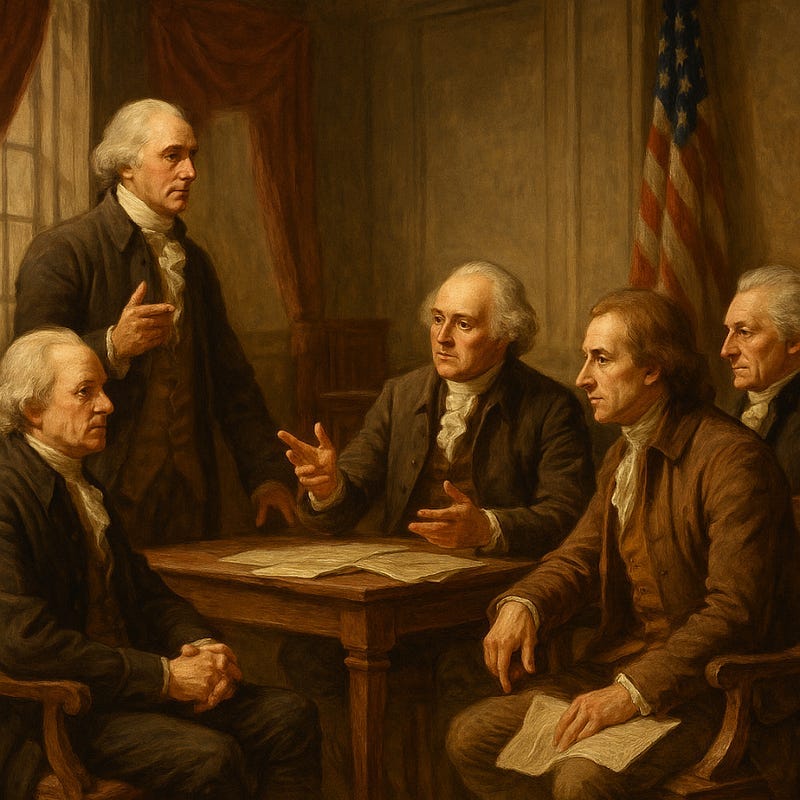Founders on Resistance: Parties, Factions, and Balance.
George Washington — Warning Against Parties
Farewell Address (1796)
“The alternate domination of one faction over another, sharpened by the spirit of revenge… is itself a frightful despotism. But this leads at length to a more formal and permanent despotism.”
Washington cautioned that parties would create cycles of revenge that could end in tyranny.
⸻
John Adams — Fear of Division
Letter to Jonathan Jackson (October 2, 1780)
“There is nothing which I dread so much, as a division of the republic into two great parties, each arranged under its leader, and concerting measures in opposition to each other. This, in my humble apprehension, is to be dreaded as the greatest political evil under our Constitution.”
Adams viewed two great parties as the most dangerous outcome of republican politics.
⸻
James Madison — Factions as an Inevitable Check
Federalist No. 10 (1787)
“The latent causes of faction are thus sown in the nature of man… Liberty is to faction what air is to fire.”
“Extend the sphere, and you take in a greater variety of parties and interests; you make it less probable that a majority of the whole will have a common motive to invade the rights of other citizens.”
Madison argued factions cannot be removed without destroying liberty. In a large republic, the competition of many factions would prevent domination by any one.
⸻
Thomas Jefferson — Resistance Through Party Organization
Letter to Henry Lee (May 8, 1825)
“Men by their constitutions are naturally divided into two parties:
1. Those who fear and distrust the people, and wish to draw all powers from them into the hands of the higher classes.
2. Those who identify themselves with the people, have confidence in them, cherish and consider them as the most honest and safe… depository of the public interests.”
Letter to Albert Gallatin (October 16, 1810)
“The duty of an opposition party is to resist by all peaceable means the measures of administration which they deem unwise or wicked.”
Jefferson accepted that organized parties were necessary for resisting policies that threatened liberty.
⸻
James Madison — Acceptance of Opposition
Letter to Thomas Jefferson (October 17, 1788)
“In every political society, parties are unavoidable… a division of the republic into two great parties is to be dreaded as the greatest political evil. Yet in the present situation of America, a division of parties is not without use.”
Madison recognized the dangers but conceded that party opposition could be useful in checking abuses.
⸻
Key points:
Washington and Adams warned of the dangers of parties.
Madison explained factions as inevitable and later accepted their utility.
Jefferson embraced parties as a necessary form of resistance.
Conclusion: The founding generation did not design a two-party system as an ideal. Yet in practice, they recognized that organized opposition became the functional way to resist domination and preserve balance in the republic.
⸻
Closing Argument: Why Apathy is Worse than Opposition
Choosing not to vote because you dislike both parties may feel like a protest, but in practice it is surrender. The Founders knew factions were messy and sometimes dangerous, yet they also understood that organized opposition is the only force that keeps power in check.
When you withhold your vote:
You silence yourself while others still speak.
You give more weight to those who do show up.
You allow the very forces you oppose to consolidate power without resistance.
Voting in opposition is not about perfect alignment with a party. It is about resisting excess, checking abuses, and keeping the system accountable. In a two-party system, refusing to choose does not punish both sides equally. It rewards the side you fear most.
In the words of Jefferson, parties exist so that citizens can “resist by all peaceable means the measures of administration which they deem unwise or wicked.” The ballot box is still the most peaceful and powerful tool for resistance.
So the real danger today is not voting for the “lesser of two evils.” The real danger is apathy — because apathy is how the greater evil wins without a fight.



